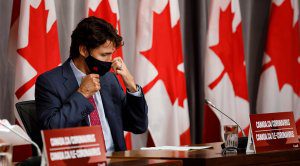 Regional solutions, avoiding disaggregated risk, and management based on flow science together offer hope that this next wave, or the next pandemic, does not deal the same crushing blow as COVID-19 did this spring, writes Shawn Whatley in the Epoch Times.
Regional solutions, avoiding disaggregated risk, and management based on flow science together offer hope that this next wave, or the next pandemic, does not deal the same crushing blow as COVID-19 did this spring, writes Shawn Whatley in the Epoch Times.
By Shawn Whatley, October 7, 2020
The first wave of COVID-19 hit at the peak of hospital overcrowding. Decades of trimming the meat while leaving the untouchable fat left some communities declaring a state of emergency. As we enter the second wave, here are three lessons we should have learned from COVID-19 already.
First, pandemics are regional. They do not infect the whole country like a giant paint roller covering each corner with an equal burden of disease. Pandemics are not egalitarian. Some regions suffer more than others; some patients bear a greater burden of illness.
Much like Canadian politics, pandemics require a regional response. What works for the Cornwall hospital may not work for the Queensway. Scarborough will look different than Sudbury, and so on. Fortunately, most hospitals have smart, motivated teams to run them. They do not need direction; they just need permission. Given the freedom to find creative solutions to local problems, they will design plans to protect the communities they serve that far surpass anything a small group of experts could design from a boardroom a thousand kilometres away.
Second, we cannot disaggregate risk. We cannot focus on one leak in a boat that has many leaks. We need to focus on the whole boat. Focussing on one risk—in this case, COVID-19—to the exclusion of all others may decrease the damage posed by the one risk, but it increases the total risk overall. Our boat still sinks.
Again, hospital managers know this. They spend their careers balancing demands from equally dire situations: breast versus bladder cancer; counselling versus cataract surgery. One risk, even a massive one, almost never warrants ignorance of all the others. Vulnerable people suffer from multiple vulnerabilities. We need to protect them from all risks to life and limb, not just the one that has caught the attention of media.
The lockdown presented at least as great a risk—a greater risk, in some cases—as the pandemic, for many patients. We will not know the extent until we measure the morbidity and mortality over the next few years. Much of it we will never know. But measurement misses the point; hospital managers could have mitigated much of this if they had been allowed to balance the risk of COVID against the risk of cancelling necessary treatment.
Finally, resilience is not magic. Flow scientists have taught us since the 1950s that systems which face unscheduled demand function best at just over 80 percent capacity. If we staff a coffee shop to guarantee that the staff are maximally busy all the time, then customers must wait. The same applies for everything from elevators in apartment buildings to major highways. Dreams of maximum capacity guarantee failure. We cannot run hospitals at (and above!) 100 percent capacity. Again, most hospital managers know this. They will deliver the performance that the system rewards and allows. Lately, we have neither rewarded nor allowed evidence-based flow solutions.
Risk forces us to re-examine how we lead. Complicated systems—for example, space shuttles and ocean liners—require better rules and more precise control to decrease risk. Complex systems—for example, child raising and romantic relationships—require creativity to decrease risk. Better rules and precise control can only function to the level of intelligence already baked into the rules. When a novel threat hits, rules offer no solution.
Canadian health care is a complex system. It demands diversity and nuance and defies central control. Complex systems function best with less attention to clear rules and measurable goals and more attention to incentives and principles.
Call it the paradox of complexity. Incentives and principles achieve real goals that are far better than the ones we dream up in boardrooms but never achieve in real life.
Regional solutions, avoiding disaggregated risk, and management based on flow science together offer hope that this next wave, or the next pandemic, does not deal the same crushing blow as COVID-19 did this spring.
Shawn Whatley is a physician, past president of the Ontario Medical Association, and a Munk senior fellow at the Macdonald-Laurier Institute. He is also the author of an upcoming book titled “When Politics Comes Before Patients—Why and How Canadian Medicare is Failing.”




